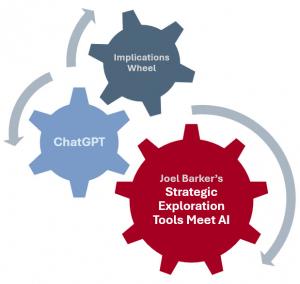New Report Identifies Possible Implications of NCAA’s Decision Allowing College Athletes to Bet on Professional Sports
A Structured, Custom AI GPT Look at a Defining Change in College Athletics
The Implications Wheel provides decision-enhancing information for leadership, a substantial advantage in finding, recognizing, and securing the future.”
MILWAUKEE, WI, UNITED STATES, October 9, 2025 /EINPresswire.com/ -- A new report, First Order Report: NCAA Policy Allowing College Athletes to Bet on Professional Sports, offers the first structured exploration of the immediate, direct consequences of the NCAA’s 2025 decision to permit athletes, coaches, and staff to wager legally on professional sporting events.— Joel Barker
The study used the Implications Wheel, a strategic foresight tool developed by futurist Joel Barker. It offers 32 possible first-order implications that emerge directly from the rule’s adoption. The implications were generated with the Implications Explorer, a custom GPT trained on the Implications Wheel concepts and rules. The report emphasizes analytical discipline and clarity, identifying what changes first before speculating on what might follow.
According to the author, the report “establishes a factual baseline from which future analysis can responsibly evolve. Its value lies in its restraint—clarifying immediate effects without drifting into conjecture.”
________________________________________
Background: From Prohibition to Managed Autonomy
For decades, the NCAA strictly prohibited athletes and staff from wagering on sports, viewing it as incompatible with amateurism and the integrity of competition. The policy change follows years of mounting tension between NCAA governance and the broader sports landscape, especially after the 2018 Supreme Court decision in Murphy v. NCAA, which allowed states to legalize sports betting independently.
By 2025, with sports wagering legalized in most U.S. states, the NCAA Division I Board of Directors voted to permit betting on professional sports while maintaining bans on wagers tied to collegiate events or insider information. The rule, expected to take effect as early as November 1, 2025, represents a strategic shift from prohibition to risk management and education.
The change coincides with a broader transformation in college sports governance following the introduction of Name, Image, and Likeness (NIL) rights. Both developments signal an evolving relationship between collegiate athletes and commercial systems that redefine autonomy, financial literacy, and institutional oversight.
________________________________________
Key Findings: The 32 First-Order Implications
The report identifies 32 “possible” direct implications. Each is articulated as a single, specific possibility beginning with the phrase “One possibility is…” to preserve analytic clarity.
Among the notable first-order outcomes:
• Normalization of Gambling Behavior — Betting becomes a socially acceptable activity among athletes, reducing stigma but increasing participation.
• Integrity and Enforcement Recalibration — NCAA enforcement may shift from minor violations toward protecting the integrity of college competitions.
• Increased Risk of Gambling Harm — Younger and financially inexperienced athletes may face greater exposure to addiction risk.
• Institutional Response — Universities could implement new education, counseling, and risk-monitoring programs.
• Reputational Tension — Alumni and donors may perceive the change as eroding amateur ideals.
• Financial and NIL Impacts — Athletes with NIL income have more resources for wagering, creating uneven exposure to financial risk and opportunity.
• Market Response — Sportsbooks may see new marketing opportunities, challenging NCAA boundaries on sponsorship.
• Legal and Policy Complexity — State regulators could question or constrain NCAA authority over compliance enforcement.
The report also includes implications generated from the perspective of athletes with NIL contracts and from the problem-gambling viewpoint, enriching the map of immediate consequences. These range from increased brand-management risk for NIL athletes to greater visibility for gambling-prevention efforts within university wellness programs.
________________________________________
Methodology: The First Order Approach
The analysis applies First Order Identification, a structured approach derived from Barker’s Implications Wheel. The framework is designed to capture only the most immediate and direct outcomes of a change, avoiding the speculative layering of long-term predictions.
Each implication is expressed as a discrete event or shift that logically follows from the NCAA policy’s adoption. By design, this method avoids causal chains or forecasts.
While the broader Implications Wheel model allows each outcome to be rated for Desirability (perceived benefit or harm) and Likelihood (probability of occurrence), the report omits scoring to maintain neutrality. Instead, it identifies where future multi-stakeholder evaluation could add insight—particularly through Points of View scoring by athletes, institutions, regulators, sponsors, and the public.
“In live facilitated sessions,” the report notes, “over 100 first-order implications are often generated. This report provides a disciplined snapshot of immediate change—what is visible first, before systems begin to react.”
________________________________________
Recognizing Boundaries and Next Steps
The report underscores that first-order analysis is intentionally limited. It does not examine feedback loops, adaptive responses, or long-term cultural transformations. Instead, it defines the center ring of the Implications Wheel—the foundation from which higher-order effects will later emerge.
Second-order analysis would explore how direct outcomes interact (for example, how normalization of gambling behavior affects public trust). Third-order analysis would consider systemic shifts in collegiate culture, governance, and economics.
Future exploration is expected to include multi-order mapping, stakeholder discussion, and Point of View scoring to assess desirability and likelihood across constituencies. These methods would extend early insights into structured foresight that can support NCAA governance, policy design, and public education.
James Schreier
Strategic Exploration Consultant
+1 414-828-0856
email us here
Visit us on social media:
LinkedIn
Legal Disclaimer:
EIN Presswire provides this news content "as is" without warranty of any kind. We do not accept any responsibility or liability for the accuracy, content, images, videos, licenses, completeness, legality, or reliability of the information contained in this article. If you have any complaints or copyright issues related to this article, kindly contact the author above.

